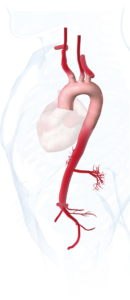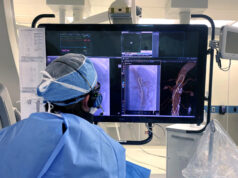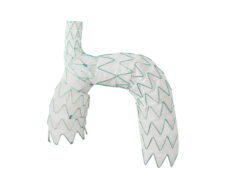 The inaugural CX Aortic Vienna meeting will be livestreamed 8–11 September 2020 to an international, online audience, and will include registrant participation, interaction, and polling.
The inaugural CX Aortic Vienna meeting will be livestreamed 8–11 September 2020 to an international, online audience, and will include registrant participation, interaction, and polling.
The programme will focus on all matters aortic—from the aortic valve to the iliac arteries. All known pathologies will be included, and imaging, diagnosis, and therapeutic options—open, endovascular, hybrid, and no intervention—will be applied to the length of the entire aorta, all the while keeping the patient front and centre. On each of the four days, the programme will cover abdominal and thoracic topics.
CX Aortic Vienna 2020 is brought to you with the participation of the Austrian Society of Vascular Surgery (ÖGG), the Italian Society of Vascular and Endovascular Surgery (SICVE), the Swiss Society for Vascular Surgery (SGG), and Aortic Surgery “HOW TO DO IT” (HTDI).
In the abdominal aortic section, there is an enduring fascination with the importance of diagnostic imaging modalities, as well as how to maintain endovascular aneurysm repair (EVAR) results, or instead turn to open repair. There will be dedicated discussion around open and endovascular choices to treat abdominal aortic aneurysm, with a focus on sac size and EVAR follow-up, ultrasound versus CT surveillance after EVAR, and current research into the best imaging modalities for EVAR. There is also a separate session on pathologies of the iliac vessels within the pelvis. In the juxtarenal section, the programme will explore methods to overcome the challenging aortic neck, using all manner of open and endovascular means.
In the thoracic aorta, there will be sections dedicated entirely to the aortic arch, and every aspect of dissecting aortic aneurysm, especially with regard to the timing of intervention. All treatment approaches will be considered and comparisons of open and endovascular methods made in a stepwise, methodical manner.
In the thoracoabdominal section, there remains obvious interest in spinal cord ischaemia and how to reduce the risk of this, with or without cerebrospinal fluid drainage.
In an important collaboration, the ÖGG will be joined by the SGG in the creation of a combined livestreamed programme. The SICVE will also have a livestreamed programme and HDTI will show Aortic Techniques & Technologies.
All about the aorta
Roger Greenhalgh (London, UK), the founding chair, explains the evolution of aortic management, contextualising the need for an aortic-specific educational meeting: “What I would like to know is the pathology behind any problems with the aorta. This might be very different: for example, with the ascending aorta, with the arch of the aorta, the great vessels to the brain and risk of stroke, the descending aorta—four different pathologies there, atherosclerosis, dissection, transection, and ulceration. How do you diagnose those, how do you image those, how do you know which is the best way to treat them in the first place?
“We still live in an era where it is possible for patients to be referred to one hospital and have an open operation for the aorta, and to another hospital and have an endovascular approach. It should not be right for it to dependent upon which hospital or specialist you get sent to, whether a patient should have endovascular or open. The patient should have the right treatment [speakers’ emphasis]. There should be discussions in centres on whether an open or an endovascular approach is best, it should not be a territorial matter. Let us encourage every patient to be considered with all options, and have an open mind about open surgery and endovascular.
A focus on decision-making in the patient’s interest
Roberto Chiesa (Milan, Italy) will be specially filming open and endovascular technical procedures of how to best manage the diseases of the arch of the aorta, considering whether to intervene or not based on the underlying pathology.
He will outline the importance of a forward-thinking, non-biased approach and running daily multidisciplinary meetings in the patient interest to decide which, if any, is the best treatment.
A comprehensive meeting on aortic therapies
Afshin Assadian (Vienna, Austria), the current president of the ÖGG, describes CX Aortic Vienna as a “comprehensive meeting on aortic therapies” taking in contributions from speakers covering a wide range of specialties.
Alexander Zimmermann (Zürich, Switzerland) comments that the livestream format will enable widespread participation, enabling all colleagues interested in vascular medicine “to participate and actively contribute to this event” easily, wherever they are in the world.










